Foundation of All Perfections 1-15
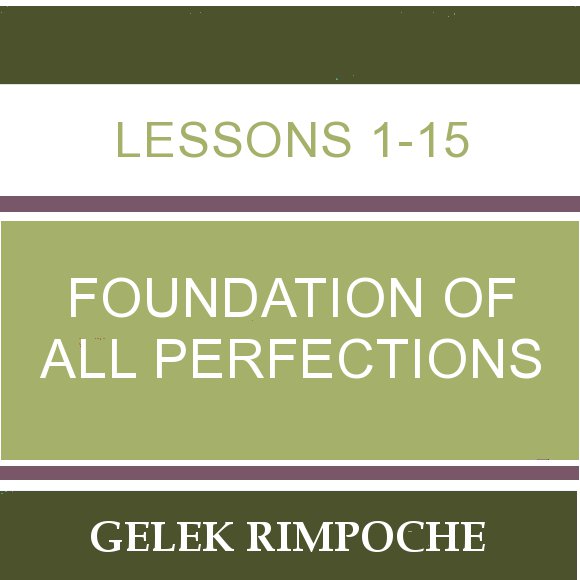
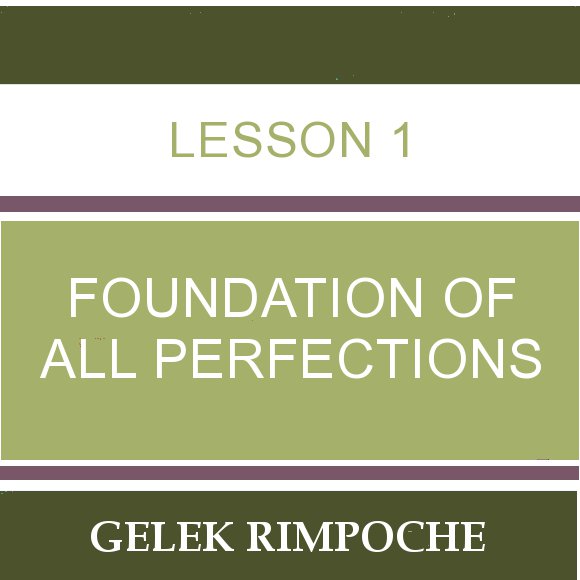
Lesson 1 – Foundation of All Perfections
Lesson Number 1 of 30
Lesson 1: Is Devotion to a Guru Really Necessary on the Spiritual Path?
Gelek Rimpoche confirms that our relationship with a guru provides the necessary foundation for our spiritual development as we progress along the path to enlightenment. But, he stresses that it is the student who chooses the guru, NOT the other way around. Of course, after the student makes a choice, the guru may or may not accept him or her. The Guru is necessary because he or she provides us with a link to the enlightened beings and is the root of all development, especially in the Vajrayana Buddhist path.
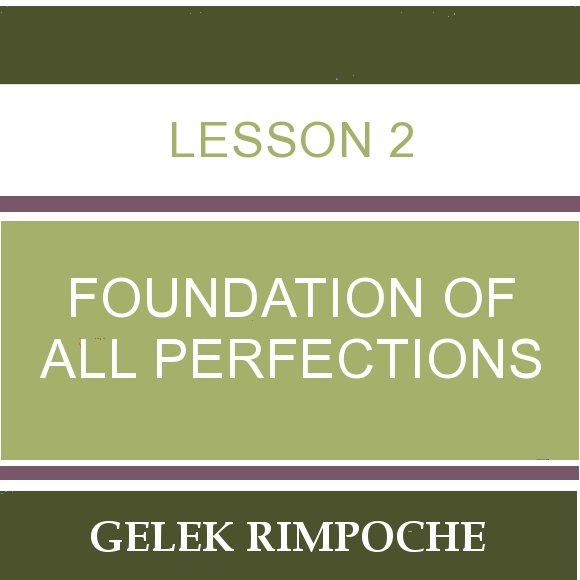
Lesson 2 – Foundation of All Perfections
Lesson Number 2 of 30
Lesson 2: How Do You Choose a Spiritual Master?
One must choose one’s spiritual master carefully. Gelek Rimpoche explains the ten important criteria for choosing one’s guru, explaining that first and foremost a guru is your spiritual role model. Therefore, we should observe him or her very carefully for a period of time, and notice how he or she handles negative emotions such as anger and attachment. One doesn’t need to consult the guru on business or family matters, but should focus on the guru as a spiritual role model. Rimpoche says the first three of the ten criteria or qualities are essential. For the other seven, there’s some ‘discount’, because no one’s perfect.
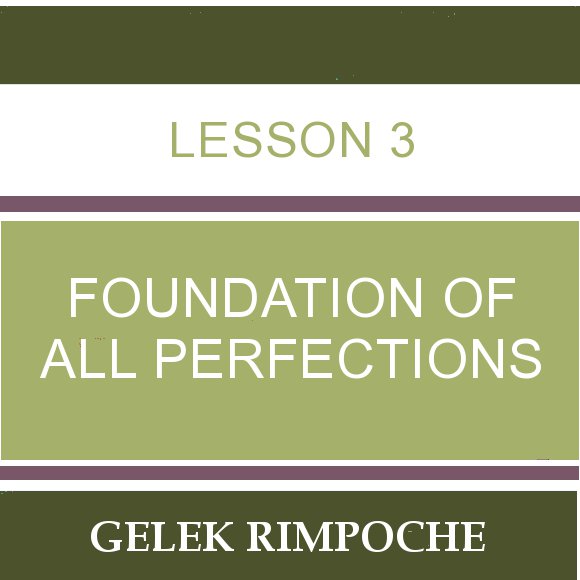
Lesson 3 – Foundation of All Perfections
Lesson Number 3 of 30
Lesson 3: Continuation of Discussion on Guru Devotion
Gelek Rimpoche continues his discussion of guru devotion, from the point of view of one choosing a guru and also how to behave when one becomes a teacher oneself. He stresses the importance of relying on the ten criteria of a suitable guru for making that choice, rather than upon intuition, dreams or visions. He then discusses the proper motivation and actions if you yourself were the teacher. As a teacher, you must not be selling yourself, but rather be focused on helping other. Your motivation must be totally altruistic, you should know more than the people you are teaching, and you must never manipulate people. There should be no financial consideration, nor should ego enter into it.
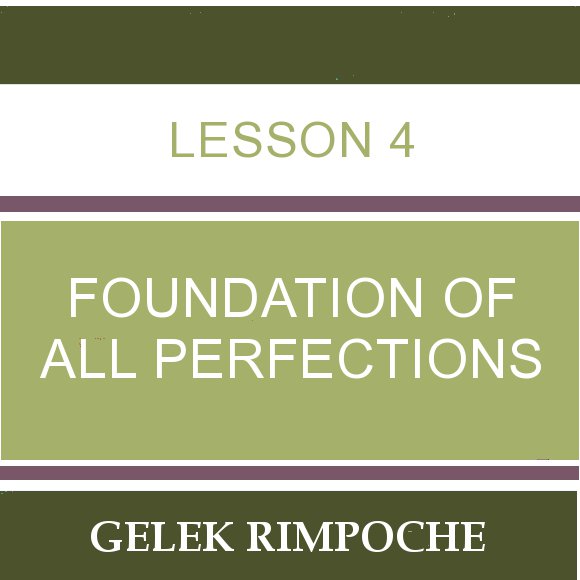
Lesson 4 – Foundation of All Perfections
Lesson Number 4 of 30
Lesson 4: Questions and Answers about Guru Devotion
During a question and answer period, the difficult topic of how to heal after being hurt by one’s guru is discussed. Rimpoche reminds that it is the charge of each practitioner to seek out a kind and wise guru, and that teacher-student relationship can only be judged from within the relationship. Rimpoche gives several historic examples of complex and charged teacher-student relationships. Again, Rimpoche stresses the importance of guru devotion practice, which JeTsong Khapa called the root of all development, as well as the personal nature of the relationship and the sensitivity of the subject.
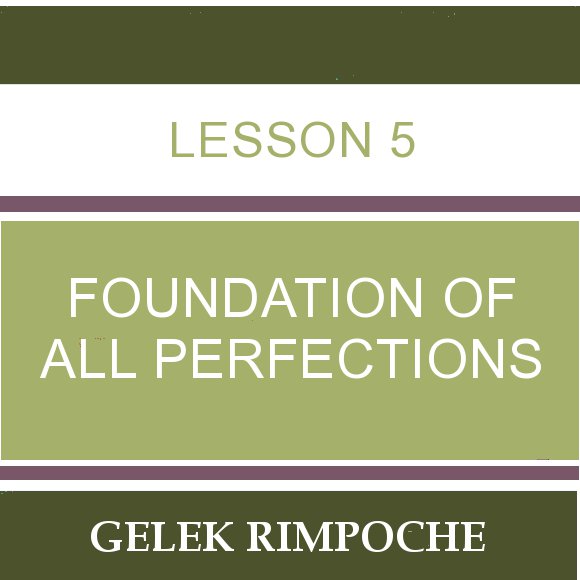
Lesson 5 – Foundation of All Perfections
Lesson Number 5 of 30
Lesson 5: How to Deal with Anger at One’s Guru
Is it possible to experience severe punishment from one’s guru and not experience anger? Rimpoche uses his own experience growing up in the monastery to illuminate the concepts of punishment vs. rehabilitation, and how he dealt with the consequences of his own mischievousness without developing anger toward his gurus and attendants. The ability to stay with guru devotional practice through trials and tribulations is key to entering and succeeding in Vajrayana practice. Rimpoche says being angry with the root guru is one of the heaviest downfalls that can pull us away from enlightenment. However, it’s OK to politely disagree with the guru.
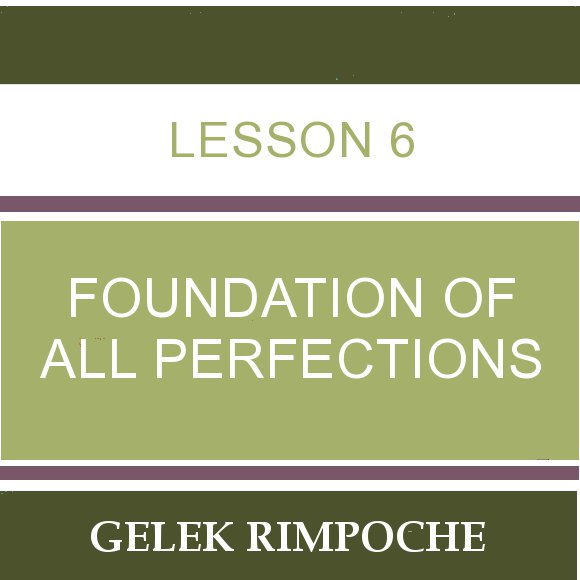
Lesson 6 – Foundation of All Perfections
Lesson Number 6 of 30
Lesson 6: What Makes Our Precious Human Life So Precious?
In this teaching Rimpoche emphasizes the necessity for us to see our lives as they really are: endowed with many wonderful qualities and leisures, and rich with opportunity for spiritual growth and development. We have a great opportunity in this time and place to take in the teachings. In addition to this great opportunity we need a very solid spiritual path, such as was introduced by the Buddha. Rimpoche encourages us to recognize the value of our life, and think, what can I achieve with this life? There is nothing that you cannot achieve with this life.
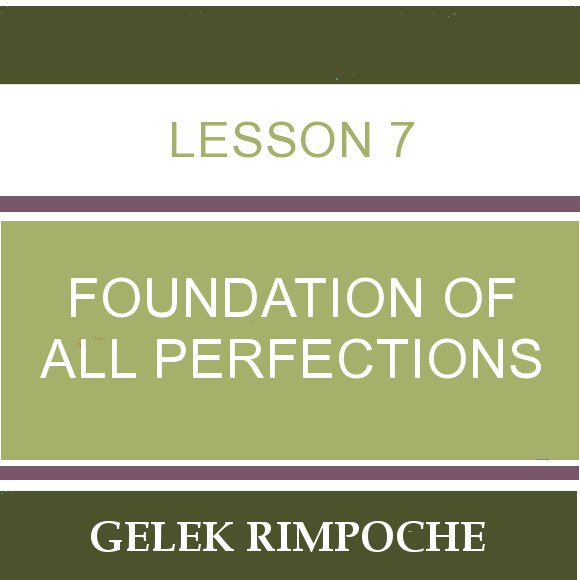
Lesson 7 – Foundation of All Perfections
Lesson Number 7 of 30
Lesson 7: Continuation of Discussion on Precious Human Life
Rimpoche explains what sets our human life apart from the lives of those of other realms, such as animals. He urges us to recognize both the qualities of this life and the opportunities, and to use it to fulfill our highest aspirations. Rimpoche teaches that our precious human life is like a wish-fulfilling gem or a magic genie. Usually we take our life completely for granted. First, we have to recognize that we have a life. Then, we have to recognize the qualities of our life and particularly its opportunity. Being born human, we have the extraordinary quality to be able to understand and communicate. Not every human can take advantage of his or her human life.
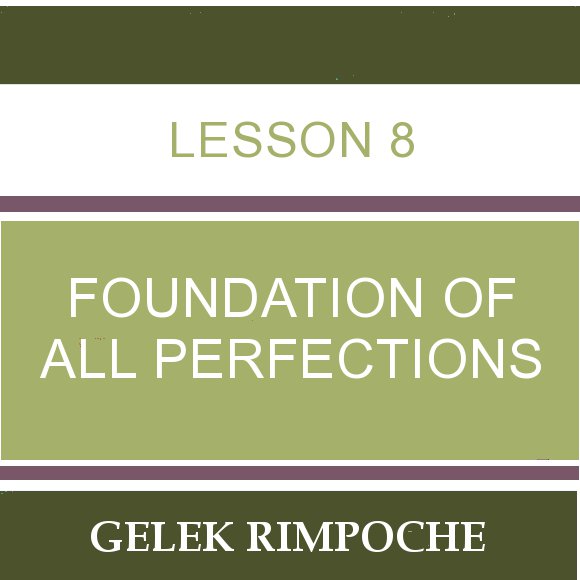
Lesson 8 – Foundation of All Perfections
Lesson Number 8 of 30
Lesson 8: The Importance of Not Wasting Our Precious Human Life
Rimpoche asks: What good is our precious human life if we do not recognize its value? Realizing, through the lens of reincarnation, the difficulty in finding a human life with the capabilities and leisures that we have will help light a fire to our spiritual practice. For we do not know what awaits us after death. From the viewpoint of reincarnation, this life is very difficult to find, and there are no guarantees as to how we will come back. Rimpoche recommends using this precious human life to study and practice Tsong Khapa’s teachings, which are like pure refined gold.
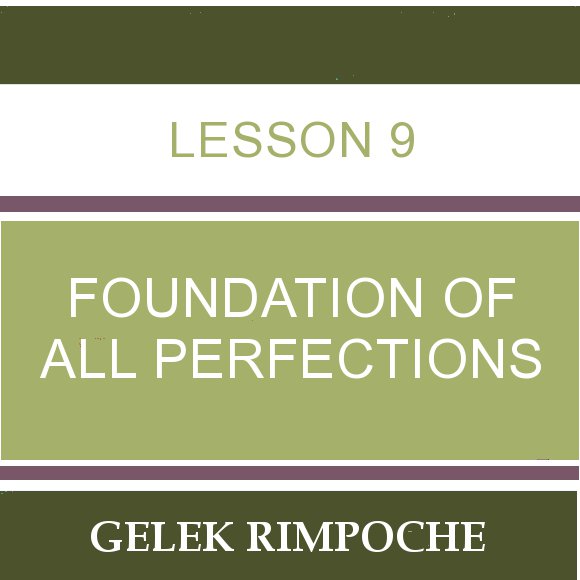
Lesson 9 – Foundation of All Perfections
Lesson Number 9 of 30
Lesson 9: Death Is Definite
Gelek Rimpoche exhorts us to not waste time in perfecting the aspects of this life, but rather to concentrate on developing our minds, and purifying them. Death is definite, but the time of death is uncertain, so it is important not to wait. We are impermanent and change every second. Death is the biggest change. Four conclusions about the reality of existence: Birth is concluded by death; accumulation is concluded by exhaustion; companionship is concluded by separation; importance is concluded by downfall. Rimpoche cautions us not to build up a struggle around our spiritual practice, but to just do the best we can and relax.
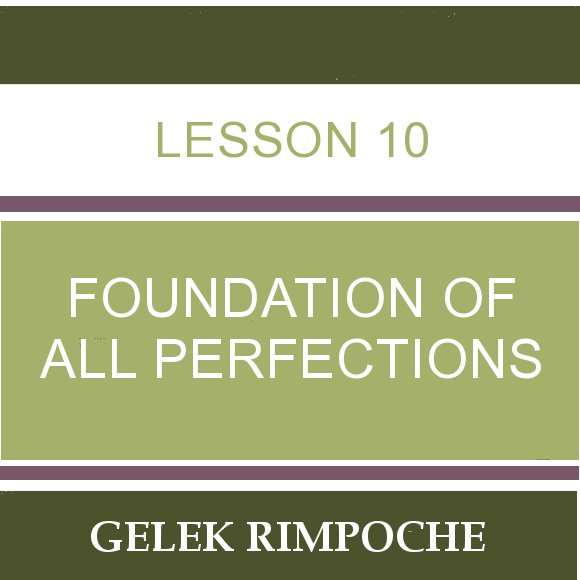
Lesson 10 – Foundation of All Perfections
Lesson Number 10 of 30
Lesson 10: Meditate on Death Daily
Is it death that we are afraid of, or what comes after death that is so terrifying? When our body goes, what happens to our mind? Gelek Rimpoche guides us through a detailed account of the state in-between death and life, and because the time of death is uncertain, he urges us to meditate on our future death daily. Rimpoche leads a guided meditation on gross impermanence, death. He urges us to make a strong resolution that we are going to die, and to meditate on that resolution, and that will change our perspective on life. We do this meditation to overcome our laziness.
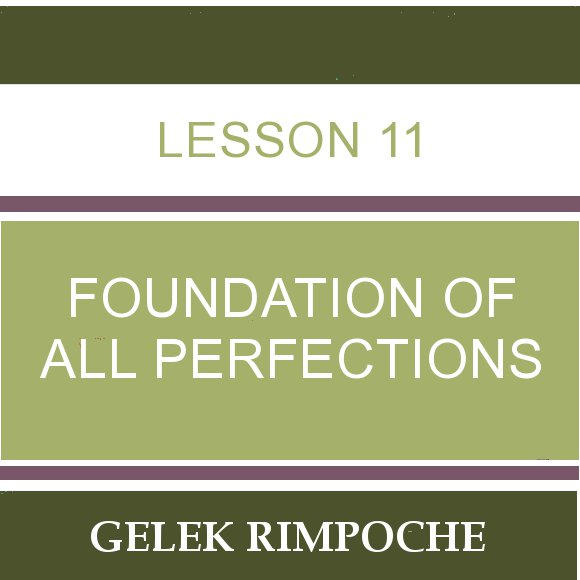
Lesson 11 – Foundation of All Perfections
Lesson Number11 of 30
Lesson 11: When We Die, Our Karma Is What Matters Most
What do we carry with us when we die? Are we able to take our loved ones, our wealth, or our fame? Gelek Rimpoche says karma is the only thing we carry with us through the death process. We leave the physical behind, but the mind continues on and carries our negative and positive karma, which is a reflection of our deeds. And our karma determines our future life as well. Karma has the characteristics of being definite, specific to the person, and fast growing. All phenomena are dependent arising, and change when terms and conditions change. That’s why karma, although it definite, can be neutralized. A solid foundation in the reality of karma will help us in our spiritual path.
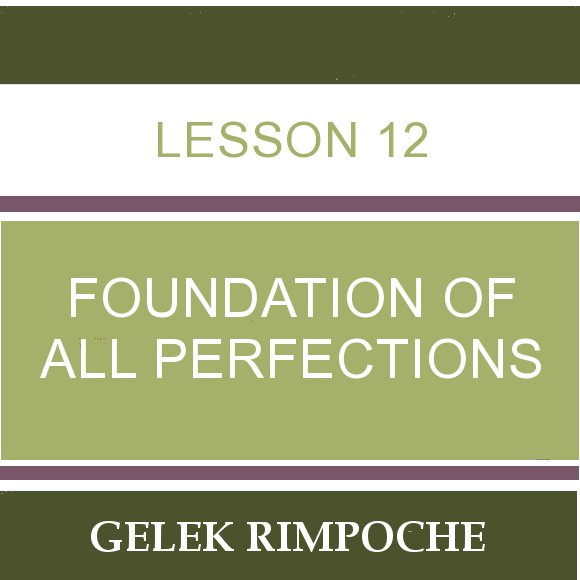
Lesson 12 – Foundation of All Perfections
Lesson Number 12 of 30
Lesson 12: Questions and Answers: How Does Karma Work?
In this interesting question and answer session with his students, Gelek Rimpoche explains that positive and negative karma cannot simply cancel each other out, but rather will each ripen independently. And he tells us that all karma must be dealt with eventually, regardless of the level of the spiritual practioner. We can’t change negative karma into positive karma, but the act of purifying our negative karma does create positive karma. Yesterday’s person who created the karma is not the same as today’s person, so the person experiencing the results of an action is not really the same person who created the cause. However the “result” person is the continuation of the “cause” person. If you don’t deal with your karma, even if you become a better person, it will have its own consequence.
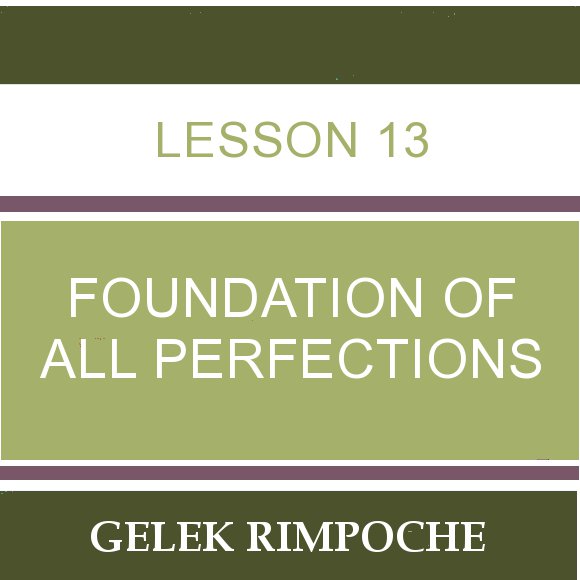
Lesson 13 – Foundation of All Perfections
Lesson Number 13 of 30
Lesson 13: Live Your Life According to the Rules of Karma
We don’t know how long our life will be, but, no matter what happens, we’re going to die. Death presents us with the unique opportunity to get in touch with our original source, the “primordial mind.” At the time of death we touch the primordial mind at a very subtle mental level. Then we “pop back up,” and we carry along with us the results of our karma—our good and bad deeds from our previous life. All physical, mental and emotional activity creates karma. Before karma starts functioning we can work with it, but after it begins functioning we can do nothing. Because of karma we can end our suffering once and for all, or we can create more suffering. Living our life according to karmic “rules” is really the beginning of our spiritual path.
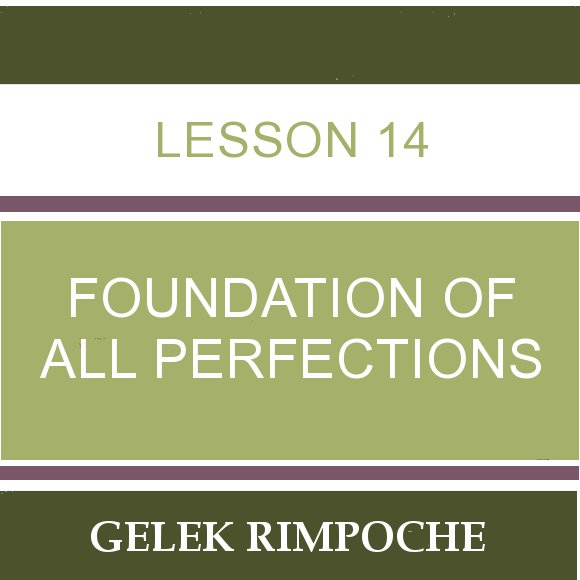
Lesson 14 – Foundation of All Perfections
Lesson Number 14 of 30
Lesson 14: Reduce Negativity, Increase Positive Actions, Watch Your Mind
Gelek Rimpoche tells us, when we learn to help ourselves, then we can begin to help others. But how do we help ourselves? We watch ourselves. Our dharma is to correct our thoughts, which then leads to the correction of our actions. Discarding wrongdoing is the path of all spiritual people, Buddhist or non-Buddhist. And when we act out of love and compassion rather than negative emotions, the possibility of causing harm is greatly reduced. Dharma in Tibetan is Ch, which means “correction.” For example, we correct our anger by turning it into patience. We discard wrong not because someone is going to punish us, but because we understand how karma works. The essence of Buddhism is to try to discard wrong. Everything thereafter is just technique. Buddha said the essence of his teaching was to reduce negativity, increase positive actions, and watch your mind.
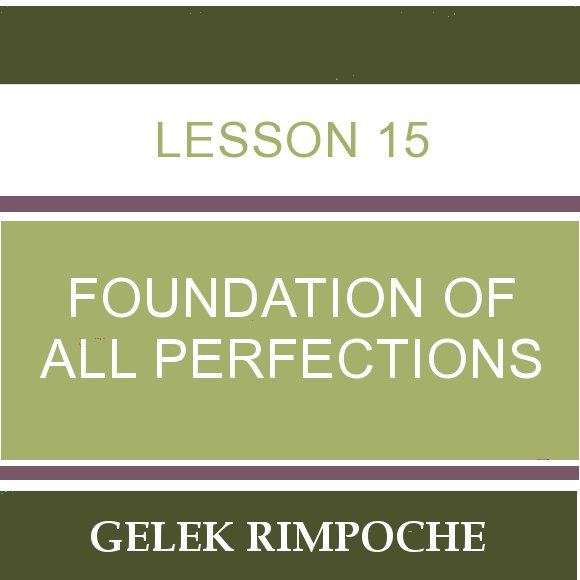
Lesson 15 – Foundation of All Perfections
Lesson Number 15 of 30
Lesson 15: Hinayana Level Is “Ground Zero” For All Buddhist teachings
Is it necessary to maintain Hinayana principles when following the Mahayana path? Gelek Rimpoche answers that question with an emphatic “Yes!” In fact, without the ground or base of the basic principle of renunciation, Rimpoche says we are just building ice castles with our Mahayana (including vajrayana) practices, which will melt away and leave us with no spiritual development whatsoever. Rimpoche explains how the Foundation of Perfections is divided into the common with the lower, medium and Mahayana levels. The ground of self-liberation and the teachings of karma are necessary in order to make any gains through our Mahayana meditation and practices.


